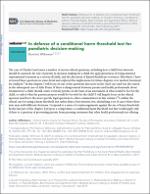Chapter 5 In defense of a conditional harm threshold test for paediatric decision-making
Author(s)
Wilkinson, Dominic
Collection
WellcomeLanguage
EnglishAbstract
The case of Charlie Gard raises a number of serious ethical questions, including how a child’s best interests should be assessed, the role of parents in decision-making for a child, the appropriateness of trying untested experimental treatment in a serious ill child, and the allocation of limited healthcare resources. Elsewhere, I have reviewed these questions in some detail and explored the implications for future disputes over medical treatment for children.1 In this chapter, I will focus on one of the questions that arose in the Gard case and was also raised in the subsequent case of Alfie Evans. If there is disagreement between parents and health professionals about treatment for a child, should courts overrule parents on the basis of an assessment of what would be best for the child, or only if what the parents propose would be harmful for the child? I will largely focus on the ethical question (and leave the more specific legal questions to other commentators in this volume).2 I outline the ethical case for using a harm threshold test rather than a best interests test, identifying a set of cases where these tests may yield different decisions. I respond to a series of counterarguments against the use of harm thresholds. In the last part of the chapter, I propose a compromise, a conditional harm threshold test that would apply only if there is a question of preventing parents from pursuing treatment that other health professionals are offering to provide. I explore the implications of this test for a set of challenging cases similar to the Gard/Evans cases, setting out two different alternatives for evaluating the harm of prolonging life in children with absent consciousness.
Keywords
ethical decisions; child; parents; Gard case; Alfie EvansISBN
9781509924912Publisher
Hart PublishingPublisher website
https://www.bloomsburyprofessional.com/hart/Publication date and place
Oxford, 2019Grantor
Classification
Medicine: general issues


 Download
Download